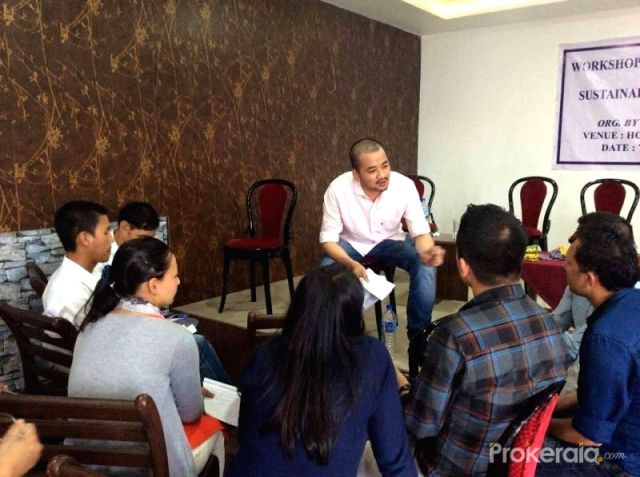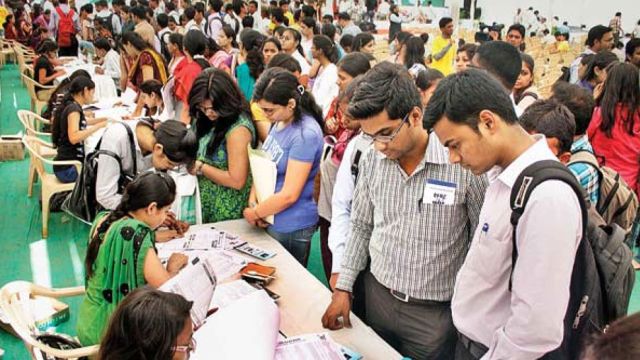
by admin | May 25, 2021 | Business, Business Ideas, Emerging Businesses, Employment, Entrepreneurship, Home-Based Business, Investing, Medium Enterprise, Private Jobs, SMEs, Startup Basics, Your Business Plan

Founder of NE Taxi Rewaj Chhetri
By Sarwar Kashani,
Gangtok : Sikkim has many distinctions that give the tiny state nestled in the Himalayas between India and China a larger-than-life profile. It is the only organic state in India, is litter- and defecation-free, has high literacy and has the best working conditions for women. But the challenge of unemployment it faces is huge which has made many embrace entrepreneurship to not just generate jobs for themselves but to provide employment to the state’s aspirational youth.
Amid negligible presence of the private sector and government employment opportunities already saturated, a small but dedicated band of young entrepreneurs is meeting the challenge head on — using innovative start-ups to generate jobs. Home to nearly 610,000 people, Sikkim boasts of being the third-richest state (after Delhi and Chandigarh) by per capita income in the country.
In 2008, Sikkim became India’s first open defecation-free state. Eight years later, it became the country’s first and the only organic state. A nationwide survey in 2016 said the state had the best working conditions for women in India. The literacy rate is seventh highest and its young are educated but, without jobs, drifting into drugs and despair.
The state has the second-highest unemployment rate in the country after Tripura, also in the Northeast. The unemployment rate per 1,000 people aged more than 15 years was at 136 in 2016-17 in the state, according to the Annual Employment and Unemployment Survey report. Another singularity this least populated state in India holds is that 10 per cent of its population is in government jobs — which is way above the national average of 3.5 per cent.
That is why Chief Minister Pawan Chamling has an advice for thousands of youth waiting for jobs in the state: They should overcome the desire to get government employment and, in fact, help the state to create jobs for others. Some of the youth have taken a cue from the Chief Minister who has been ruling the state for a quarter of a century now.
Among them is serial entrepreneur Rewaj Chettri, who has launched over 30 enterprises — the most recent being the taxi aggregator app, NE Taxi. He started the app with Rs 300 that he spent on purchasing a domain name www.netaxi.in, using shared hosting two years ago. NE Taxi is a tourist cab service catering to travelers in the northeast. He now employees 26 people and has his “annual turnover crossing Rs 3 crore”, making it to the Forbes list of Asia.
“We are a bootstrapped company and all the profits are pumped back to grow the business. We are set to expand to North India by the end of 2020,” Chhetri told IANS.
“I feel that the state government was a platform provider and opportunity creator… We all just need to grab it,” he said, referring to the government’s start-up scheme that aims to disrupt mindset of the youth and instill entrepreneurship spirit among them.
Through the start-up scheme, the government provides financial assistance in terms of seed capital of 25 per cent of the project cost — even 35 per cent in certain cases — entailing total investment up to Rs 20 lakh.
The remaining portion of the project cost has to be arranged from banks by way of loans.
Chhetri and other budding entrepreneurs have started what they call a “Entrepreneurs’ Hub and Consultation Centre” where they build sustainable robust start-up ecosystem in Sikkim with the government’s support.
Among some 3,000 beneficiaries of the initiative is Devika Kerongay, the founder of Fidgety Fingers, a social enterprise that “empowers” women by teaching them craft and knitting, “teaching them how to fish rather than giving them fish to eat”, Kerongay said, adding she needed no investment and took no finances.
“It was started to empower underprivileged and rural women financially and socially… and to reintroduce and preserve the vanishing art form of fibrecraft,” she told IANS.
Women mainly belonging to underprivileged families — school drop-outs, young mothers, urban poor and from rural areas — are trained free of cost to knit, crochet and craft at her enterprise of fibrecraft — the art of making useful and decorative objects by hand or by using only simple tools.
After training, the women either start their own enterprises, or work with Fidgety Fingers that markets their products.
“We have always received encouragement and moral support from the government. The government acquires our products for their officers as well as various of its official functions. The support has been incredible.”
Yougan Tamang is a researcher, journalist, blogger and also a social entrepreneur. A gold medalist in anthropology and a Sikkim State Awardee 2013, Tamang now owns a digital media house Sikkim Chronicle that he co-founded with his friends Nirmal Mangar and Kabita Sharma last year.
“I (always) wanted a job from which I would never retire. Entrepreneurship provided me one. My love for traveling, meeting new people and learning and sharing ideas led me to start Sikkim Chronicle.”
It doesn’t stop there. Tamang wants to expand the Chronicle into a bigger media house “not just in Sikkim but in the entire Northeast”.
The way out of unemployment through entreprenuership and skill development is also helping the otherwise “golden state” with all-round development battle depression and suicidal tendencies of its youth. Sikkim, according to a report, has one of the highest suicide rates in the country.
According to a 2016 study by Indian Journal of Psychiatry, some 1,604 suicide cases were recorded from 2006 to 2015 in the state that also battles a scourge of drug abuse. A majority of those who killed themselves were found unemployed.
(The weekly feature series is part of a positive-journalism project of IANS and the Frank Islam Foundation. Sarwar Kashani can be contacted at sarwar.k@ians.in)
—IANS

by admin | May 25, 2021 | Corporate Jobs, Employment, Private Jobs
 New Delhi : Paytm Mall, owned by Paytm Ecommerce Pvt. Ltd, on Friday launched the second edition of the Campus Icon programme, and aims to recruit 5000 college students.
New Delhi : Paytm Mall, owned by Paytm Ecommerce Pvt. Ltd, on Friday launched the second edition of the Campus Icon programme, and aims to recruit 5000 college students.
The industry-focused learning programme for five weeks is designed to help students to enhance their vocational capabilities. The participants will be assigned a variety of exercises in technology, marketing and sales that would enhance their skills.
Top performers of the programme would be announced on October 10 in a ceremony at the Paytm Campus in Delhi NCR, and be awarded up to Rs 1 lakh in cash prize along with full-time job offers from Paytm Mall.
Launched first in 2017, the programme recruited 2,200 students, the company said in a statement.
“The inaugural edition of our Campus Icon Programme turned out to be a great success with students participating from thousands of colleges across the country. This year, we plan to reach out to even more students — making Campus Icon one of the largest Campus-connect programmes in India,” said Amit Sinha, Chief Operating Officer – Paytm Mall.
“With this programme, we want to create a unique learning experience for the next generation of young professionals and help them in harnessing their skills and showcasing talent,” Sinha added.
In addition, the company, along with Intel India, will also host webinars to educate students on the technology ecosystem and opportunities in the country.
Paytm Mall Campus Icon registration is currently live for students across 6000 Campuses in 25 States. Students can log on to campusicon.paytmmall.com and file their nominations, the statement said.
—IANS

by admin | May 25, 2021 | Employment, Government Jobs
 Patna : Nearly five lakh candidates, mostly engineering and Ph.D degree holders, have applied for 4,257 posts of guest teachers in the government-run schools of Bihar, officials said on Tuesday.
Patna : Nearly five lakh candidates, mostly engineering and Ph.D degree holders, have applied for 4,257 posts of guest teachers in the government-run schools of Bihar, officials said on Tuesday.
“We have received nearly five lakh applications for 4,257 posts of guests teachers in schools. It is much beyond our expectation,” an official of the Education Department said.
According to the officials, nearly 80 per cent of candidates who have applied are from engineering stream, mostly B.Tech and M.Tech degree holders.
The state government decided to appoint guest teachers to cope with the shortage of teachers in its schools.
—IANS

by admin | May 25, 2021 | Business, Corporate, Corporate Governance, Employment, Large Enterprise, News, Politics
 Panaji : Union Shipping Minister Nitin Gadkari’s recent push for promotion of cruise tourism could boost employment in the sector, the promoter of a Goa-based culinary training institute has said.
Panaji : Union Shipping Minister Nitin Gadkari’s recent push for promotion of cruise tourism could boost employment in the sector, the promoter of a Goa-based culinary training institute has said.
Addressing a press conference here, Parixit Pai Fondekar, who heads the American College of Culinary and Language Arts also said that an employment boom was expected in the cruise liner industry.
“The Central government’s push to promote cruise tourism and the Mumbai-Goa-Bali cruise circuit proposed by Union Shipping Minister Nitin Gadkari will really boost employment in the cruise tourism sector along the Western Coast,” he told reporters.
The global luxury cruise line industry, he said, is one of the fastest growing sectors within the global hospitality industry and requires training and skilled employees.
He said that international luxury cruise line companies are looking towards India, Goa in particular, to meet its culinary requirement needs, adding that Goan culinary professionals account for a significant chunk of the Indian workforce in the industry.
“It is estimated that over the next five years, 950 cruise ships will enter the Goan waters,” Fondekar said.
According to statistics of the Cruise Lines International Association, in 2017 Indian ports accounted for a total of 128 cruise ship calls only.
—IANS

by admin | May 25, 2021 | Corporate, Corporate Governance, Corporate Jobs, Employment, News, Politics
 New Delhi : Recruitment of officers from the private sector, corporates and multinational companies will pose a serious threat to the nature of public service in the bureaucracy, the CPI-M has warned.
New Delhi : Recruitment of officers from the private sector, corporates and multinational companies will pose a serious threat to the nature of public service in the bureaucracy, the CPI-M has warned.
“Such appointees would be prone to serve corporate interests disregarding the public interest,” said an editorial in the CPI-M journal “People’s Democracy”. “This would be the aping of the American model where corporate executives and posts in the administration are inter-changeable.”
The central government has advertised for 10 posts of joint secretary to be recruited by a committee headed by the cabinet secretary.
The applicants can be from either the public sector, universities or the private sector including those working in multinational companies. The requirement is that they should have 15 years experience in the job.
The lateral entry recruits will be on contract for three years which can be extended by another two years.
“This is just a thin end of the wedge,” the Communist Party of India-Marxist said.
“Lateral entry is being pushed by none other than the Prime Minister himself. It is part of the grand privatisation plan…
“The lateral entry policy comes in the background of a large cut in the recruitment of IAS officers – nearly one-third after liberalisation was ushered in. The shortage, thus, created is now sought to be filled up by recruitment from the private sector.
“The other notable feature is that the Union Public Service Commission (UPSC), which is the constitutional body enjoined to select civil services cadre, is being bypassed.”
The editorial pointed out that in earlier times, lateral entry was restricted to a narrow band – mainly of economists who were appointed as economic advisors to the economic ministries, or, the chief economic advisor.
But now lateral entry at the key joint secretary level was being opened up for all the economic and infrastructure ministries.
“The lateral entry route will be utilized to infiltrate RSS-Hindutva minded personnel into the higher echelons of the civil service – a process which has been going on in other areas where the government makes direct appointments,” the editorial said.
It said the integrity of the civil services, particularly the IAS, must be protected. The democratic accountability of civil servants to the political authority should not be disturbed.
At the same time, provision for specialization and domain knowledge should be made.
“But the efforts to bypass the UPSC and directly recruit senior civil servants through the political authority of the day must be opposed. The lateral entry policy should be reversed,” it said.
—IANS





